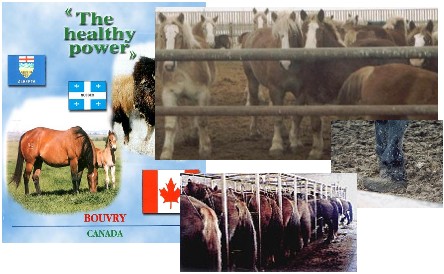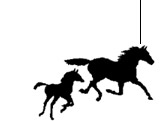|
The Slaughter Market
Where do the horses come from?
A viable business is always dependent upon the availability of a product, as well as consumer demand. As long as European and Asian markets continue to import horsemeat, and the demand for the product does not diminish markedly, the horse slaughter industry in Canada attempts to meet those market requirements and to reap financial benefits. Meat prices are in a constant state of fluctuation, depending on many factors, including the current popularity of various types of meat. It is believed that the recent BSE crisis, with concerns about beef safety, has resulted in a greater demand for horseflesh overseas.
Where does an ongoing supply of slaughter-bound horses originate?
It is clear that certain industries involved in breeding horses have been shown to create an equine surplus--for example, the Pregnant Mare Urine (PMU) industry. Farms involved in urine collection are situated in the Canadian prairie provinces (Alberta, Saskatchewan, Manitoba) and North Dakota. During the fall of 2003, as increased health risks associated with use of the hormone replacement drug, Premarin*, made headline news throughout the world, Wyeth Pharmaceuticals announced cutbacks to its associated ranching operations.
Up to 20,000 pregnant mares were suddenly out of work, and flooded auctions and feedlots throughout Canada and the United States. Unwanted stallions, as well as yearlings and two-year-old horses previously held as replacement stock, also entered the market. In past years, at the peak of its career, the PMU industry had seen up to 75,000 pregnant mares hooked up to urine-collecting devices on approximately 500 farms. Although various sources disagreed on numbers of foals sent to slaughter from the industry, estimates ranged up to 45,000 annually.
 L. to R., clockwise - Bouvry's website home page photo;
L. to R., clockwise - Bouvry's website home page photo;
The reality - PMU horses being fattened for slaughter in a Bouvry meatpen;
overgrown hoof of horse in a Bouvry meatpen; typical urine collection line on PMU farm.
With the decline of the PMU industry, and only 130 contracts renewed for the 2004-2005 season, it is reasonable to expect that fewer foals and other industry horses will appear on the market in future. However, as recently as February 2004, prairie feedlots were still full of draft and draft-cross horses, clearly from PMU ranching operations. Subsequent reports indicate that certain feedlot operators plan to use industry horses as brood mares in order to maintain an abundant supply of cuts from young, draft/quarter horse crosses--allegedly the most popular type of horsemeat on overseas dinner tables.
Backyard breeders, horse-related business ventures that have failed, and irresponsible private homes are additional, huge sources of feedlot-bound horses. Instead of choosing euthanization for lame, elderly, ill or otherwise unwanted animals, certain horse owners prefer to take them to auction, an "easy out" solution. Meat dealers often frequent auction marts, and have purchased countless numbers of "family pets" over the decades.
Food for thought:
1. Should private horse owners and businesses be expected to show more responsiblility for the fate of unwanted horses?
2. Must Canadian horses be a meat source for foreign dinner tables, or do we have a moral obligation to keep our horses in Canada and out of the food chain?
Further information on Premarin and associated health risks:
Yusuf, Dr. Salim and Anand, Dr. Sonia, "Hormone replacement therapy: a time for pause", Canadian Medical Association Journal, August 20, 2002; 167 (4), link
"Help us lead Canada's horses away from barbarism . .
and into the protected pastures of a civilized
nation."
|


